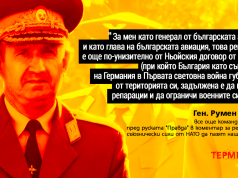Just one week after the British made their decision in the referendum about the United Kingdom’s membership of the European Union (EU) and voted to leave the union by 17.5 million votes to 16 million, a number of profound analyses have appeared in the press – mainly in the foreign press. However, a number of Bulgarian specialists have written of the reasons for such a fateful decision and the potential consequences. This text will look only at the facts, not at the insinuations or manipulations. From the very outset, we will distance ourselves from superficial explanations of the vote by calling the English “stupid” or some pointless comparison between cosmopolitan London and the depths of the English provinces. Nor is the rapid spread of “mad cow disease” in the same constituencies one of the main reasons why the majority voted to leave the EU, despite the amazing coincidence of certain maps on the social networks, whose authenticity has not been verified.
The English are not stupid and the vast majority of them are not xenophobic. On the contrary, they are one of the most tolerant countries in terms of foreign languages and cultures. The British aren’t afraid of leaving their country and starting a new life in another country where they don’t have family or roots, where they don’t know the language and have only superficial knowledge of the culture and customs in their newly chosen home.
All they need is to have some reason (even irrational) to attract them to the country. We saw that in Bulgaria during the property boom between 2003-2008. Entire villages, even in the exotic regions such as the largely deserted “triangle of death” – Elhovo, Grudovo and Zvezdets, a name acquired during the years of communist army presence, have been restored by English, Scots and Irish. They bought wholesale abandoned houses for 10 000 levs and became the most regular clients of the local “mixed stores”, where the debt book is often longer than “War and Peace”.
The English and the Welsh are intelligent, polite, curious, open and unprejudiced about the unknown. The same is also true for the Scots and the Northern Irish. However, England (outside London) and Wales voted predominantly to leave the EU.
The problem lies with migrants from other EU countries, not with refugees from the Middle East.
The shortest answer in all sociological inquiries is that voters in England and Wales have a problem with one of the basic principles of the EU – the free movement and opportunity to work within the borders of the EU. The supporters of the leave campaign during the referendum deftly used the fear of the growing streams of migrants from the new EU members, including and mainly Bulgarians and Romanians (the so-called “EU-2”). Despite the insistence of the pro-Putin scare-mongers that Grandmother Merkel is guilty of Brexit because she invited Middle Eastern refugees into the EU, this claim cannot be upheld. In the United Kingdom there are no migrants from the wars in the Middle East resulting from the Arab Spring. However, this is a fact not mentioned by the professors of everything, golf sociologists or Facebook journalists who jump from party to party and do the rounds on Bulgarian television stations.
The Office of National Statistics in the UK reported that since the beginning of the civil war in Syria in 2011, the United Kingdom has granted asylum to about 5000 Syrian refugees, while for the whole of 2015, only 25,000 applied for asylum. In actual fact many of the applications are actually from Pakistanis, one of the traditional immigrant communities in the United Kingdom since the years of the British Empire. This number is much smaller than the number of refugees in 2002, when 82 000 applications were made (mainly from citizens of Iraq, Zimbabwe and Afghanistan). In 2015, the most applications for refugee status in the EU per 100,000 head of own population was received by Hungary. They received 1500 per 100,000. In comparison with United Kingdom received 50 times less, or 30 applications per 100,000 own population. The statistics speak for themselves: 15 years ago the refugee problem was much greater in the United Kingdom than it is now.
Cameron’s government fulfilled its promise at the end of last year to accept 1000 persons on the Vulnerable Persons Resettlement Programme (VPR), mainly from Syria and confirmed his resolve to increase the total of persons to 20 000 by 2020. This is an insignificant number in comparison with the 65 million population of the United Kingdom. Most significantly, the acceptance of refugees from Syria, Iraq, Afghanistan and Norther Africa is approved by more than 65% of the British population, according to sociological investigations. The so-called “refugee crisis” in Europe is not seen as a problem in the United Kingdom. The British problem is migration within the borders of the EU itself, rather than cross-border migration. If we compare the refugee pressure in the United Kingdom with that of other EU countries, the results are astonishing. The UK occupies one of the last places in terms of registered asylum applications. Even Bulgaria, which is not regarded as having a “refugee” problem, as at least 6 times (!) more asylum applications per 100 000 head of population.
The main problem for the undecided voters in the UK was in fact the problem of so-called “net migration” from other EU countries to the United Kingdom. In 2015 alone, 330 000 more persons settled in the UK from EU countries, mainly Poland, Rumania and Bulgaria, than British who left the UK to settle in other EU countries. This has become an established trend in Britain over the past two decades. This trend increased significantly after the former socialist countries joined the EU, and after the 1st January, 2014, then the work restrictions were removed for Bulgarians and Rumanians. It is calculated that on average 500 000 migrants enter the UK per annum from the EU alone. At the same time, however, about 150 000 – 170 000 British or EU citizens leave the United Kingdom to settle in other countries, including the European Union. Thus net migration to the UK is about 330 000 persons per annum (from the EU alone).
This is how the British were manipulated with the irrational fear of economic migration by Poles, Rumanians and Bulgarians while the media called it the (invasion) by “the barbarians at the doors”, in reference to the eponymous book on the corporate greed of Wall Street. However much such well-known British economists and politicians, including former Prime Ministers, Tony Blair, Gordon Brown and John Major, claimed that this economic migration could only be in the interests of the British nation, the British just treated it with a dose of scepticism. The irrational fear of this internal EU migration which Nigel Farage, the leader of UKIP, the UK Independence Party, turned into its political doctrine, resulted just one week ago in those British regions with the least Eastern European migrants voting in favour of leaving the EU.
More than 3 million Asians from India, Pakistan, Bangladesh and other countries live in the United Kingdom. They came from the former British colonies after the end of the Second World War, but they are not seen as a threat to the United Kingdom. However, slightly less than 2 million Eastern Europeans enjoying their right to free movement and settlement in the EU, and their right of access to the local labour market and social system are. Nigel Farage said quite clearly during his election campaign for the parliamentary elections in 2015 that he preferred immigrants from India and Australia to those from Eastern Europe.
Cameron’s government fell into the trap of fear and promised to reduce annual net migration from 330,000 to a few tens of thousands. However, he did not have the tools necessary to do it.
Who was playing on the fears of the British?
Terminal 3 has already published a commentary on the public campaign “for” and “against” remaining in the EU. We shall only reiterate that most of the damage was done by the so-called “traditional” British media who took an open pro-Brexit stance and became the bastions of populism and inexplicable, and irrational fear.
Such media are the Telegraph Media Group, including The Daily Telegraph, The Sunday Telegraph, and The Spectator which led an open anti-EU campaign, deliberately creating the image of the hated, slothful Eurocrat and useless army of 170,000 highly paid EU officials in pointless institutions. However, the facts are completely different. No more than 55 000 people work in all the institutions, agencies and organisations of the EU. Moreover, they work for an exceptionally competent and professional administration which covers most of the areas of the economy, foreign policy, justice and social welfare of the 500 million inhabitants of the EU. Compare this with the total number of persons employed in the Bulgarian administration, which as of the 31st December, 2015 was 137 693 full-time staff. Or compare it with Birmingham City Council (a city of about 1.1 million) where about 33,000 persons work (!). This is more than the officials in the European Commission.
Most of the media controlled by Rupert Murdoch were openly Eurosceptic. For example, newspapers in the Sun group, the most popular tabloid, or the Sunday Times. Their motto was “BeLeave in Britain”! While violating the most fundamental journalistic standards, the Sky television channels founded by Murdoch also called for Brexit. This can be seen even in the televised debates in which the leaders of the two campaigns took part. Only the “Times”, which is also owned by Murdoch, managed to maintain its neutrality and even editorially supported remaining in the EU. Murdoch himself, at a meeting of eminent business leaders organised by the Times in London the day after the referendum, stated directly that leaving the EU was like escaping from prison. He also called Donald Trump a “very capable person”. However, we shall leave the comparison between Brexit and Trump’s presidential campaign for another time.
Newspapers in the Express, Sunday Express, Daily Star and Daily Star Sunday group also joined in the Eurosceptic chorus.
The same was also true of the Mail Group (The Daily Mail and The Mail on Sunday).
Most of these media have sharply changed their tone and this week surprisingly published neutral comments or even criticised leave voters.
It is no surprise either that the leaders of the Brexit campaign in the Conservative party were also at one time journalists – both Boris Johnson and the chancellor, Michael Gove.
The media are fundamentally to blame for what happened last week. The UK press playing the populist card led the United Kingdom into a dead end. Nigel Farage’s political genesis was entirely based and developed on the fear of migration, ending in the referendum. It it’s written in a newspaper, it must be right! However, it was all based on migration from Bulgaria and Rumania.








